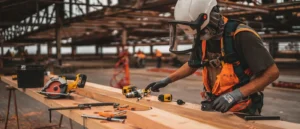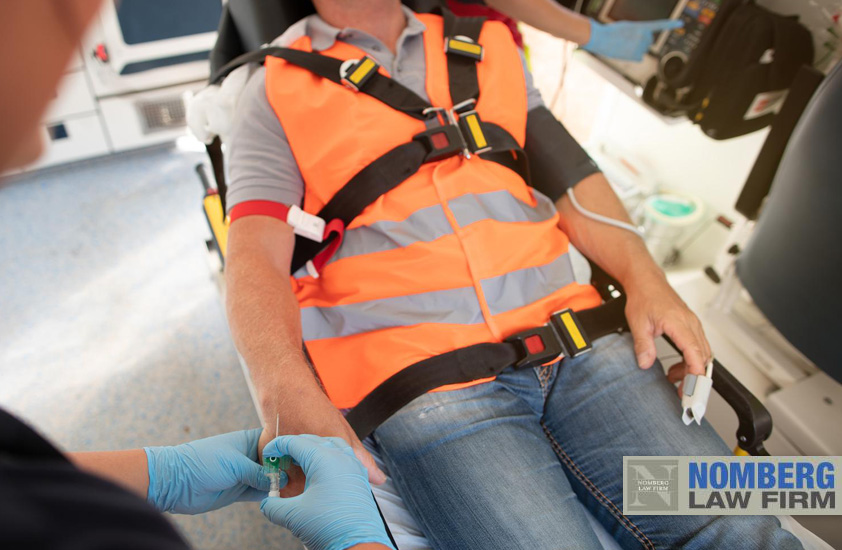Working in the construction industry in Birmingham comes with its fair share of risks. Whether you’re operating heavy machinery, working at heights, or dealing with hazardous materials, the potential for injury is always present.
Fortunately, if you’ve been injured on the job in Alabama, you may be eligible for workers’ compensation benefits during your recovery.
Workers’ compensation is designed to support workers who suffer on-the-job injuries or occupational diseases by providing certain benefits, but understanding how to apply for and calculate these benefits is crucial.
This article will help you understand your rights and responsibilities when it comes to Alabama workers’ comp so you can get the benefits you need to support both your physical and financial recovery.
What is the most common cause of on-the-job injuries to construction workers?
Falls are by far the most common cause of injuries and deaths for construction workers, which should come as no surprise since more than 62% of these workers are exposed to heights.
According to the U.S. Bureau of Labor Statistics (BLS), in 2021, the construction industry experienced a staggering number of fatalities, with nearly 1 in 5 workplace deaths in the U.S. occurring on construction sites.
More than one-third of these construction fatalities were caused by slip, trip, and fall accidents, with the vast majority involving falls to a lower level. Construction accounted for almost half (46.2%) of all fatal falls, slips, and trips at work in the U.S. that year, with 1,015 reported.
These statistics highlight the critical need for enhanced safety measures and awareness within the industry to protect workers from such preventable accidents.
What is the most common injury suffered by construction workers?
In addition to falls, construction workers face a variety of risks on the job that can result in catastrophic injuries and death, including:
- Fractures and broken bones. These injuries frequently result from falls from ladders, scaffolding, or rooftops. They can also occur when workers are struck by falling objects like tools or materials or when limbs are caught under heavy machinery or building materials (which is also a common cause of amputations). These injuries often require extensive medical treatment and lengthy recovery periods.
- Spinal cord injuries. Falls from significant heights or being crushed by collapsing structures or heavy equipment can lead to serious spinal cord injuries. These injuries often result in partial or complete paralysis and require extensive medical care and rehabilitation.
- Head injuries. Head injuries, including concussions, brain bleeds, and traumatic brain injuries (TBIs), can happen when a worker falls and strikes their head or when they’re hit by falling objects. Even with hard hats, severe impacts can cause significant damage, leading to long-term cognitive and physical impairments.
- Back and neck injuries. Heavy lifting, repetitive motions, and falls can all cause severe neck and back injuries, such as herniated discs and whiplash. Additionally, being struck by objects or experiencing sudden impacts from machinery like forklifts can lead to debilitating pain and limited mobility.
- Internal injuries. The force of a fall can lead to internal injuries, such as organ damage, thoracic outlet syndrome, or internal bleeding. These injuries can be life-threatening and often require immediate medical intervention.
In most cases, if a worker in Alabama suffers these or other work-related injuries or occupational diseases, they’re entitled to workers’ comp benefits for medical expenses and lost wages during their recovery.
Read on to learn more about who qualifies for these benefits and how to apply.
Alabama roofing company fined after the death of a 15-year-old worker
In February 2024, the U.S. Department of Labor fined Apex Roofing & Restoration $117,175 for violating child labor laws following the 2019 death of a 15-year-old who fell 50 feet on his first day at work.
The incident occurred on July 1, 2019, when the teen, illegally employed by Apex Roofing, was working on the roof of a Cullman Casting Corp. building and suffered fatal injuries. The DOL highlighted that employing minors in hazardous jobs, such as roofing, is illegal.
Apex Roofing expressed heartbreak over the incident, noting that the teen was brought to the worksite by a subcontractor without Apex’s knowledge. The company has since claimed to have strengthened job site security and safety measures.
How does workers’ comp work in Alabama?
In Alabama, most employers are required to carry workers’ compensation insurance. Specifically:
- Any employer with 5 or more employees must carry workers’ compensation insurance.
- This requirement includes both full-time and part-time employees.
To be eligible for workers’ compensation benefits, you must be classified as an employee, not an independent contractor.
As a general rule, employees are those who work under the direction and control of an employer, whereas independent contractors typically operate their own businesses and are responsible for their own insurance.
Can I get workers’ comp if the injury was my fault?
In most cases, yes. Alabama operates a no-fault workers’ compensation system. This means that workers do not need to prove that their employer was at fault for the injury to receive benefits. The primary requirement is that the injury must be work-related.
To establish this, you must demonstrate that:
- The injury occurred while performing job duties on the job site or in a work-related activity.
- The injury happened during work hours.
For example, if a construction worker falls from scaffolding while on a job site, the injury would be considered work-related, and the worker would be eligible for benefits regardless of whether the fall was due to a safety oversight by the employer or the worker’s own mistake (as long as it wasn’t intentional or caused by intoxication or horseplay).
What steps do I need to take after a construction injury in Alabama to get workers’ comp?
If you’re injured on the job, it’s important to take the following steps to increase your chance or a successful workers’ comp claim:
- Report the injury to your employer as soon as possible. In Alabama, you should notify your employer within 5 days of any work-related accident or discovery of any injury, illness, or disease to avoid delays or denial of your claim, although you may have up to 90 days in some instances.
- Seek medical attention immediately and inform the health care provider that the injury is work-related. This is a crucial step to ensuring you have documentation that links your injury to your job. The longer you wait, the more difficult it can be to definitively make this link.
- Ensure your employer files a “First Report of Injury” form after you report your injury. This form should document the details of your injury and your wages and will initiate the workers’ compensation claim process. Your employer is responsible for submitting this report to the appropriate authorities so you can begin receiving your benefits.
If your employer refuses to file your claim, your claim is delayed or denied, or you sustain a catastrophic injury that will require extensive medical care and time off work, consider discussing your case with an experienced worker’s compensation attorney who can explain your rights and help you get the compensation you deserve.
What to do & not do when filing an Alabama workers’ comp claim
Learn about common mistakes that could ruin your workers’ compensation claim.
What benefits can I expect from workers’ compensation after a construction injury?
Workers’ compensation can provide several types of benefits to construction workers and their families, depending on the type and severity of their injury:
- Wage replacement benefits. If you’re unable to work temporarily due to your injury, you may be entitled to temporary total or temporary partial disability benefits. These benefits typically amount to two-thirds of your average weekly wage.
- Permanent partial disability (PPD) benefits. This is additional compensation if your injury results in a permanent impairment that partially limits your ability to work.
- Permanent total disability (PTD) benefits. These benefits are provided if your injury leads to a permanent disability that prevents you from returning to any form of gainful employment.
- Medical benefits. This includes coverage for all necessary medical treatments related to the injury, including doctor visits, hospital stays, surgeries, medications, and rehabilitation services.
- Vocational rehabilitation. These benefits provide assistance with job retraining or education if you’re unable to return to your previous job due to your injury.
- Death benefits. These benefits provide financial support for the dependents of a worker who dies as a result of a work-related injury, including funeral expenses and ongoing financial support.
In most cases, compensation can begin as soon as the fourth day after the work-related injury occurred. If the disability lasts for at least 21 days, the compensation for the initial 3 days will be included with the first payment due after the 21-day period.
If you have any questions about your eligibility for these benefits or need help estimating what your claim is worth, reach out to a work injury attorney for help guiding you through the process.
Injured working in construction in Birmingham, Alabama? We can help!
The reality is that a serious construction injury can sideline you for weeks, months, and sometimes, permanently. Medical bills pile up, and your family is counting on your paycheck to provide them with the things they need today and well into the future.
That’s why it’s crucial not to settle for the minimum from workers’ comp.
At Nomberg Law Firm, we’re Birmingham’s dedicated work injury attorneys for construction injuries. We understand the seriousness of these types of injuries because we’ve seen firsthand the devastation that can result when workers are not adequately compensated.
We’re committed to fighting for your rights and ensuring you receive the maximum benefits possible. Let us help you navigate the complexities of your claim and secure the financial support you and your family need during this challenging time.
Reach out to Nomberg Law Firm today to schedule your free consultation, and take the first step toward getting the full compensation you deserve.
References
Construction deaths due to falls, slips, and trips increased 5.9 percent in 2021 : The Economics Daily: U.S. Bureau of Labor Statistics. (2023, May 1). www.bls.gov. https://www.bls.gov/opub/ted/2023/construction-deaths-due-to-falls-slips-and-trips-increased-5-9-percent-in-2021.htm
Petosa, N. H. and J. (n.d.). Workplace Injuries and Job Requirements for Construction Laborers : Spotlight on Statistics: U.S. Bureau of Labor Statistics. www.bls.gov. https://www.bls.gov/spotlight/2022/workplace-injuries-and-job-requirements-for-construction-laborers/home.htm

